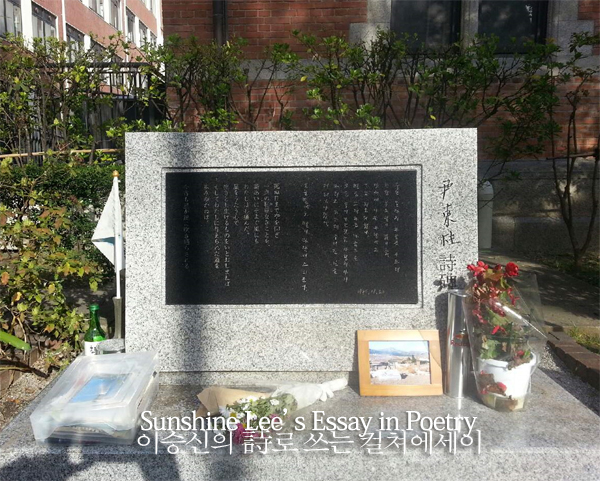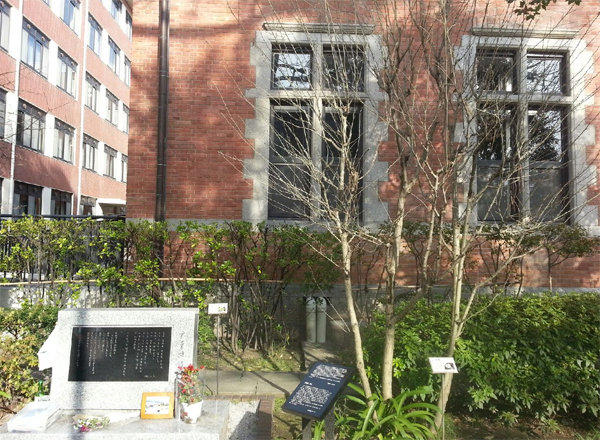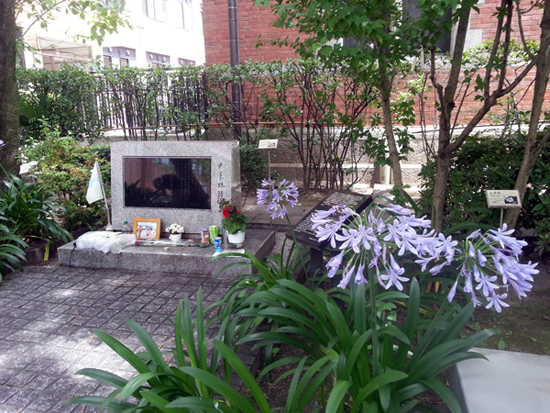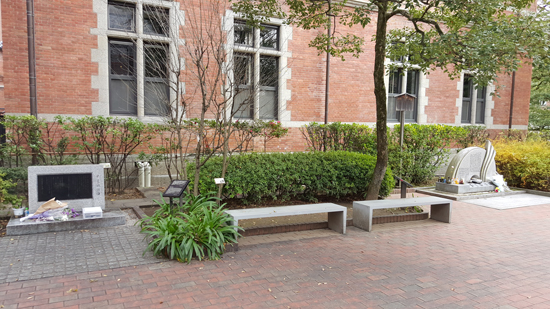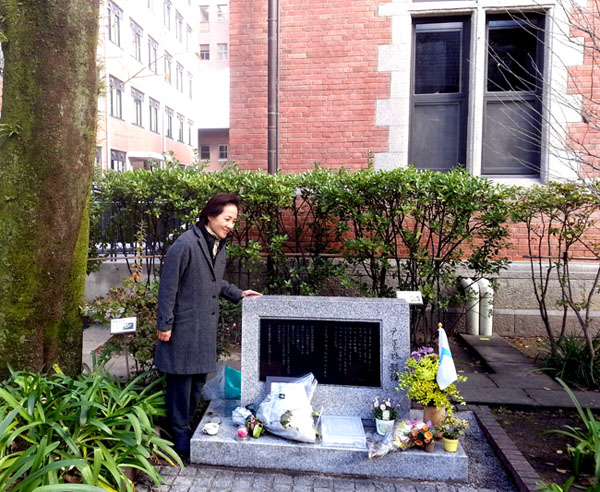February 14 2016
Gazing up toward heaven
The poetic tablet of Yun Dong-ju, on which I had my eyes on for four seasons, suits the poet’s character best in June, when the annual purple flowers blossomed in front of it.
I first found out about the existence of the poetic tablet of Yun Don-ju at Doshisha University when Prof. Nakai Akira, the president of the T. S. Eliot society of Japan, whom I met in Seoul, guided me there. Back then, I never imagined that I would pass by and look at the tablet several times a day like this.
The poet Yun dong-ju, in his dark and poor time during the Japanese colonial period, contemplating on the life and agony of humankind and grieving over the restraint of his mother country, described his heart-breaking emotions in the form of the restrained language of poetry.
He is my inspiration for introspection. His kind and pure mind guides me to be truthful.
His poetic tablet right in front of a chapel at the center of Doshisha campus, which is rather small and founded, not by Japanese, but rather by Korean alumni, seems to be bearing his profound soul and spirit.
Until the day I die Tonight, again, the wind brushes the stars.
I recite his 7 line poem in Korean and Japanese, carved on the poetic tablet.
His life of 27 years. He was born to find Japan as a mother country.
Embracing his humiliation, pain, and wounds, he wrote down his spirit with brilliant words of this kind.
Although he passed away in prison in Fukuoka a few months before the liberation and never had his book of poems published during his lifetime, he is standing in the center of Kyoto as a poetic tablet quietly embracing Korea and Japan.
There are many mementos in front of the tablet. They range from fresh and artificial flowers, pens and papers, national flags, manuscripts, umbrellas, money, even to liquor and coffee. They are from Korean visitors.
It is a usual topic of conversation that there are always flowers in front of Yun Dongju’s poetic tablet while there is usually no single flower in front of Niijima Jō新島 讓’s poetic tablet who is the founder of the university and a nationally renowned figure.
Since nobody takes care of them, it becomes messy in the rain and snow. It is not suitable scenery on this clean and beautiful campus. Probably nobody wants to be blamed for taking their hands on it gratuitously. Therefore I clean and tidy things up little by little.
I pass his poetic tablet all the time. I tell a story of the poet to the groups of Koreans who stand in front of it, sometimes even to Japanese students who were not even aware of the existence of the poetic tablet. What is most astonishing for those who didn’t know about such a great former student, is the fact that he was sent to prison because he composed his poems in Korean.
Today, again, I straighten up the flowers and mementos in front of his poetic tablet and then gaze upon the sky.
About seventy years thereafter, a poet from Korea, thinking of the poet’s spirit brought back from death, gazes up towards the same boundless blue sky that he had gazed upon.
A purple flower w/ poetic tablet in early summer - June 25 2015
Neighboring Yun Dongju poetic tablet & Jung Jiyong's - Doshisha Univ. 1 2016
Yun Dongju poetic tablet w/ many mementos - Jan 7 2015
------------------------------------------------ Lee Sunshine Poet Essayist TV Persoanality President of Son Hoyun Tanka Institute Graduate of the department of English Literature at Ewha Woman’s University, Graduate school of Georgetown University Washington & Syracuse University New York, Doshisha University, Kyoto
Chief of the International Cooperation Committee at Korean Broadcasting Commission, Senior Adviser at Samsung Media & Cheil Worldwide
Publications A Journey of Healing and Realization, Holding My Breath, Colored by Okinawa, How Could Anything But Blooming Spring Exists in Life? Where There is Your Heart, a Flower Blooms, etc.
|

